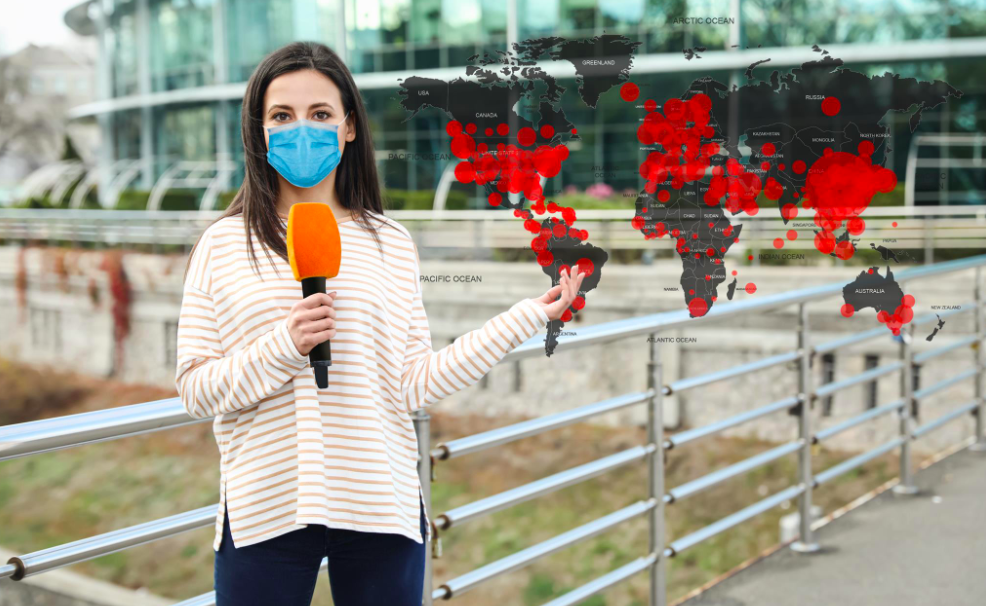Meridian 5: Takeaways from Covering COVID Globally | Changes in Reporting, Newsrooms and Press Freedoms
On September 2, the Meridian Global Journalism Initiative hosted a virtual roundtable discussion on how covering the news in the pandemic era has changed in nature along with the composition of newsrooms and global bureaus, and what the near-to long-term implications are for journalists around the world. A Diplocraft program, the dialogue served as the kick-off event for Meridian’s new platform for international journalists and communicators to connect, gain insights and exchange perspectives on the news of the day and critical issues in global media and journalism.
Moderated by Shaila Manyam, Senior Vice President for International Public Affairs at Burson Cohn & Wolfe, the program featured remarks from the following speakers:
- Nadia Bilbassy, Washington Bureau Chief, Al Arabiya
- Matthew Kaminski, Editor in Chief, POLITICO
- Dr. Courtney Radsch, Advocacy Director, Committee to Protect Journalists
Below are the top five takeaways from the conversation, and resources referenced during the discussion can be found here.

The Meridian 5: Covering COVID Globally
1. SOCIAL DISTANCING DELAYS NEWS COVERAGE. Due to social distancing restrictions, reporting is now largely done through email or phone communication, which greatly delays coverage. Nadia Bilbassy explained how the new social distancing norms make her feel less informed, particularly on her White House beat. Prior to COVID, she would be able to pull aside U.S. government officials for sideline meetings to provide on-background context or framing on the complexities of a certain policy or issue. Given the new limitations, these interpersonal interactions so critical to reporting are increasingly scarce.
2. PRESS FREEDOM IS NOT A PARTISAN ISSUE. The reporting environment amid COVID has been unprecedented for journalists, especially when it comes to press freedoms. In the last six months, journalists around the world have continued to be imprisoned, harassed, attacked or censored as a result of their reporting. Meanwhile the public health crisis has brought on an “infodemic,” where truth and access to information have been limited because of emergency shutdowns or new policies. According to Dr. Courtney Radsch, fake news is more rampant than ever, serving as a green light for authoritarian regimes to deride the press and implement fake news laws that give those governments the right to decide and define what false information is. Given the new landscape, people and governments cannot be neutral on the issue of press freedom, Dr. Radsch says.
3. POLITICS ARE A MIRROR OF SOCIETY. As the pandemic becomes a wedge issue for President Trump in his re-election campaign, journalists on the election and White House beats are working around-the-clock despite social distancing restrictions – albeit with less flair as election cycles prior. Nadia Bilbassy expressed how the color of election coverage is lost this year, owing to the virtual nature of the conventions and limited pool reporting for campaign trail activities. The politicization of the pandemic, coupled with lack of access to many sources or information along with the online harassment of journalists and media outlets, have added new challenges to election coverage. Matt Kaminski believes politics will be virtual if our lives stay that way, adding another dimension to the ‘new normal,’ post-pandemic future.
4. DECLINE OF LOCAL MEDIA THREATENS DEMOCRACY. As local media outlets are being bought up by hedge funds or closing their doors due to a dwindling advertising market, massive layoffs are happening across the journalism industry, putting thousands out of work. City-level and regional outlets are getting crushed while national-level outlets are doing well. The New York Times, Washington Post and POLITICO have all seen stable growth amid the pandemic, serving as the industry exception and not the norm, according to Dr. Radsch. The death of local media is a danger to democracy, which Matt Kaminski said needs correcting by creating a demand for more content. This could potentially be solved either by coming up with a different economic model for journalism or seeking charity supported by tech companies, like ProPublica is doing to fill gaps in reporting.
5. HOW CAN PEOPLE HELP? During the virtual breakout sessions at the end of the program, attendees asked how people and governments alike can get more involved in supporting press freedom. Dr. Courtney Radsch emphasized the need to not only raise awareness about the criminalization of journalists worldwide, but also called upon governments to investigate the whereabouts of missing journalists – 64 of which have been reported missing in 2020 – and to advocate for the release of those imprisoned. Other participants cited initiatives like the 'Hold the Line' global campaign, which was created by a coalition of partners, including Meridian Global Journalism Initiative strategic partners CPJ and ICFJ, in support of Rappler CEO Maria Ressa, who was convicted of cyber libel in the Philippines.
Project summary
| Meridian 5: Takeaways from Covering COVID Globally | Changes in Reporting, Newsrooms and Press Freedoms | September 2020 | |
|---|---|
| Regions: | Africa, East Asia and Pacific, Europe and Eurasia, Near East and North Africa, South and Central Asia, Western Hemisphere |
| Countries: | United States, China, Philippines, United Kingdom, Germany, Japan, India, North Korea, Russia, Australia, Brazil, Canada, Mexico, Argentina, South Africa |
| Impact Areas: | Media and Journalism |
| Program Areas: | Diplomatic Engagement |